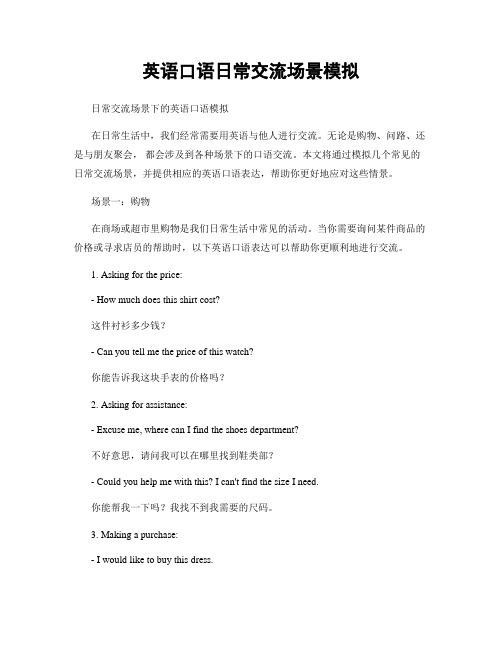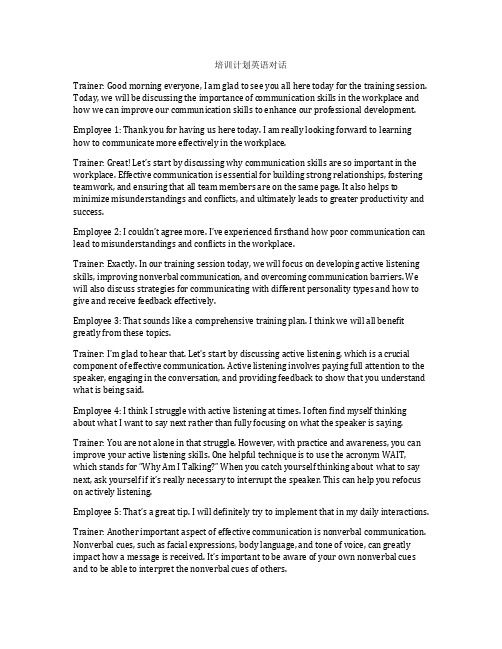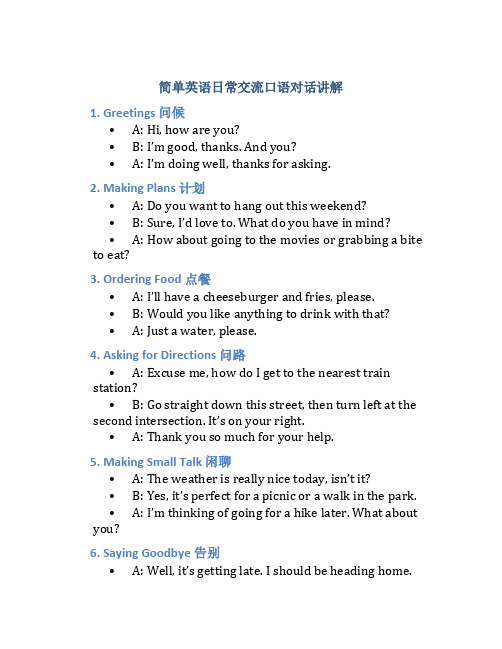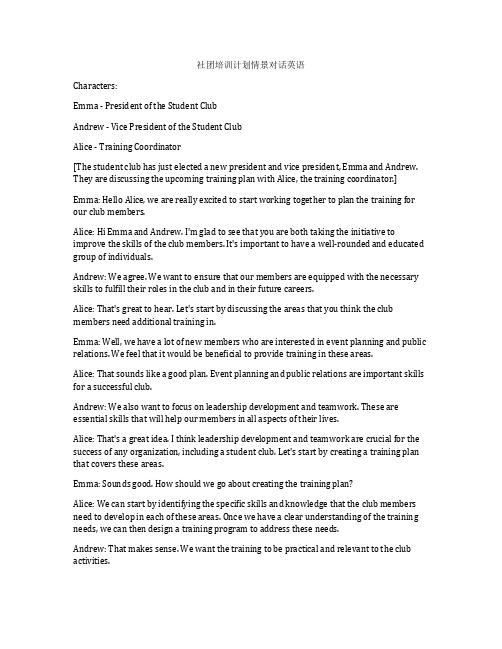社区培训课程 日常英语情景对话
英语口语日常交流场景模拟

英语口语日常交流场景模拟日常交流场景下的英语口语模拟在日常生活中,我们经常需要用英语与他人进行交流。
无论是购物、问路、还是与朋友聚会,都会涉及到各种场景下的口语交流。
本文将通过模拟几个常见的日常交流场景,并提供相应的英语口语表达,帮助你更好地应对这些情景。
场景一:购物在商场或超市里购物是我们日常生活中常见的活动。
当你需要询问某件商品的价格或寻求店员的帮助时,以下英语口语表达可以帮助你更顺利地进行交流。
1. Asking for the price:- How much does this shirt cost?这件衬衫多少钱?- Can you tell me the price of this watch?你能告诉我这块手表的价格吗?2. Asking for assistance:- Excuse me, where can I find the shoes department?不好意思,请问我可以在哪里找到鞋类部?- Could you help me with this? I can't find the size I need.你能帮我一下吗?我找不到我需要的尺码。
3. Making a purchase:- I would like to buy this dress.我想买这条裙子。
- Can I pay by credit card?我可以用信用卡支付吗?场景二:餐厅用餐无论是在咖啡馆、餐厅或者快餐店,用餐时的英语口语也是必备的。
以下是一些常见的用餐场景以及相应的英语口语表达。
1. Making a reservation:- Do you have any available tables for two at 7 pm?你们七点有没有两个人的位子?- I'd like to make a reservation for tonight, please.我想预订今晚的位置。
简单的英语情景对话

简单的英语情景对话想找一些常用简单的英语情景对话练习英语口语吗?下面店铺为大家带来简单的英语情景对话,希望对你有所帮助!简单的英语情景对话1:A:Excuse me. Where's the shop, please?A:请问一下,商店在哪里?B:The shop? Oh. Go straight on this road. Turn left at the third comer. Then you can see it.B:商店吗?哦,沿着这条街一直走,在第三个街口左转,然后就能看到了。
C:l'm walking that way. Let me lead you the way.C:我正朝那边去。
让我给你带路吧!A:Thank you very much.A:非常感谢。
C:You're welcome.C:不用谢简单的英语情景对话2:A:Excuse me. I'm afraid I got lost. Where am I on this map?A:对不起,我恐怕是迷路了,请问我在地图上的什么位置?B:We are here, bus station, we are in the heart of the city.B:我们在这里,汽车站,我们现在在市中心。
A:Oh! Can I go from here to the Zhongshan Park?A:哦!我能否从这里到中山公园呢?B:Head straight up the street about two blocks then turn right.B:顺着这条街一直走过两个街区,然后向右转。
简单的英语情景对话3:A:Excuse me. I wonder if you could help me. l'm looking for the Oriental Pearl Theater.A:对不起,打扰一下,不知您能否帮我,我在找东方之珠剧院。
基本日常生活英语口语情景对话(7篇)

基本日常生活英语口语情景对话(7篇)(经典版)编制人:__________________审核人:__________________审批人:__________________编制单位:__________________编制时间:____年____月____日序言下载提示:该文档是本店铺精心编制而成的,希望大家下载后,能够帮助大家解决实际问题。
文档下载后可定制修改,请根据实际需要进行调整和使用,谢谢!并且,本店铺为大家提供各种类型的经典范文,如工作资料、求职资料、报告大全、方案大全、合同协议、条据文书、教学资料、教案设计、作文大全、其他范文等等,想了解不同范文格式和写法,敬请关注!Download tips: This document is carefully compiled by this editor.I hope that after you download it, it can help you solve practical problems. The document can be customized and modified after downloading, please adjust and use it according to actual needs, thank you!In addition, this shop provides you with various types of classic model essays, such as work materials, job search materials, report encyclopedia, scheme encyclopedia, contract agreements, documents, teaching materials, teaching plan design, composition encyclopedia, other model essays, etc. if you want to understand different model essay formats and writing methods, please pay attention!基本日常生活英语口语情景对话(7篇)掌握好一些常用的英语口语表达,能让你的英语口语交际能力更上一层楼。
培训计划英语对话

培训计划英语对话Trainer: Good morning everyone, I am glad to see you all here today for the training session. Today, we will be discussing the importance of communication skills in the workplace and how we can improve our communication skills to enhance our professional development.Employee 1: Thank you for having us here today. I am really looking forward to learning how to communicate more effectively in the workplace.Trainer: Great! Let’s start by discussing why communication skills are so important in the workplace. Effective communication is essential for building strong relationships, fostering teamwork, and ensuring that all team members are on the same page. It also helps to minimize misunderstandings and conflicts, and ultimately leads to greater productivity and success.Employee 2: I couldn’t agree more. I’ve experienced firsthand how poor communication can lead to misunderstandings and conflicts in the workplace.Trainer: Exactly. In our training session today, we will focus on developing active listening skills, improving nonverbal communication, and overcoming communication barriers. We will also discuss strategies for communicating with different personality types and how to give and receive feedback effectively.Employee 3: That sounds like a comprehensive training plan. I think we will all benefit greatly from these topics.Trainer: I’m glad to hear that. Let’s start by discussing active listening, which is a crucial component of effective communication. Active listening involves paying full attention to the speaker, engaging in the conversation, and providing feedback to show that you understand what is being said.Employee 4: I think I struggle with active listening at times. I often find myself thinking about what I want to say next rather than fully focusing on what the speaker is saying. Trainer: You are not alone in that struggle. However, with practice and awareness, you can improve your active listening skills. One helpful technique is to use the acronym WAIT, which stands for “Why Am I Talking?” When you catch yourself thinking about what to say next, ask yourself if it’s really necessary to interrupt the speaker. This can help you refocus on actively listening.Employee 5: That’s a great tip. I will definitely try to implement that in my daily intera ctions.Trainer: Another important aspect of effective communication is nonverbal communication. Nonverbal cues, such as facial expressions, body language, and tone of voice, can greatly impact how a message is received. It’s important to be aware of your own nonverbal cues and to be able to interpret the nonverbal cues of others.Employee 6: I never realized how much nonverbal cues can impact communication. I will pay more attention to my own nonverbal communication from now on.Trainer: That’s a good star t. Being aware of your nonverbal cues can help you better understand how you are coming across to others and can also help you better interpret the nonverbal cues of your colleagues.Employee 7: I think it’s also important to be able to communicate effecti vely with different personality types. Some people may prefer direct communication, while others may prefer more subtle and indirect communication styles.Trainer: You’re absolutely right. Understanding the communication preferences of different personality types can help you tailor your communication style to be more effective with each individual. In our training session, we will discuss strategies for communicating with different personality types and how to adapt your communication style to meet their needs.Employee 8: I’m really looking forward to learning more about that. I often struggle to communicate with certain colleagues who have very different personality types from my own.Trainer: Lastly, we will discuss how to give and receive feedback effectively. Providing constructive feedback is an important part of professional growth, and being able to receive feedback gracefully and use it to improve is equally important.Employee 9: I think feedback is something that a lot of people struggle with. It can be hard to receive criticism, even if it’s well-intentioned and constructive.Trainer: I agree. However, by creating a culture of open and honest feedback, we can all benefit from each other’s insights and improve our performance. We will discuss strat egies for giving and receiving feedback in a way that is constructive and beneficial for professional development.Employee 10: This training session sounds like it will be very beneficial for all of us. I can’t wait to put these strategies into practice in my daily work.Trainer: I’m glad to hear that. I believe that by improving our communication skills, we can create a more positive and productive work environment for everyone. I look forward to our training session today and hearing about your experiences with implementing these strategies in your daily work. Thank you all for your participation, and let’s get started!。
情景对话英语日常短文

情景对话英语日常短文Dialogue is an essential part of everyday communication in English. In this short piece, we will discuss the importance of dialogue in daily life and how it can be used to improve our language skills.Dialogue is a conversation between two or more people, and it can take place in various settings, such as at home, work, school, or in public places. Engaging in dialogue helps us to express ourselves, share our ideas, and understand others better.In English, dialogue is a crucial tool for language learners to improve their speaking and listening skills. Through dialogue, we can practice using new vocabulary, grammar structures, and pronunciation. It also helps us to develop our critical thinking and problem-solving abilities.To improve our dialogue skills, we should actively seek out opportunities to engage in conversations with native speakers or other language learners. We can also watch movies, TV shows, and listen to podcasts to expose ourselves to different accents and speech patterns.In conclusion, dialogue is a vital part of our daily lives and an essential tool for language learners. By practicing our dialogue skills, we can improve our communication abilities and connect with others on a deeper level.。
日常英语口语对话练习

日常英语口语对话练习大家好,今天我给大家准备了一些日常英语口语对话练习。
这些对话将涵盖日常生活中常见的情景和话题,帮助我们提高口语表达能力和交流技巧。
让我们一起来进行练习吧!1. 在餐馆点餐情景:你和朋友来到一家新开的餐馆用餐,你们想点一些菜品。
对话:你:Excuse me, could we have a menu, please?服务员:Of course, here you are.你:Thank you. Could you recommend any specialties?服务员:Our chef's specialties are the grilled salmon and the homemade pasta. They are very popular among our customers.你:Sounds delicious! We'd like to try both of them. And could we also have some appetizers, please?服务员:Sure, we have a variety of appetizers to choose from. Would you like me to make some recommendations?你:Yes, please. What do you recommend?服务员:The bruschetta and the spinach dip are both very good choices. Would you like anything else?你:No, that's all for now. Thank you.2. 在商场购物情景:你在商场里看到一件喜欢的衣服,你想试穿并了解价格。
对话:你:Excuse me, could you help me? I'm interested in this dress. Do you have it in my size?售货员:Certainly, what size do you usually wear?你:I usually wear a medium. Do you have it in a medium size?售货员:Let me check for you. Yes, we do have one in a medium size. You can try it on if you'd like.你:Great, thank you. By the way, could you tell me the price of this dress?售货员:It's priced at $50.你:Hmm, I really like it. I think I'll take it. Could you show me where the cashier is?售货员:Sure, come this way please. The cashier is located at the front of the store.3. 在旅行中询问路线情景:你在旅游城市游览时迷路了,你向一位过路人询问如何去达目的地。
简单英语日常交流口语对话教学

简单英语日常交流口语对话教学一、自我介绍•A: Hi, I’m Lily. What’s your name?•B: Hi Lily, I’m Jack. Nice to meet you.•A: Nice to meet you too, Jack.二、问候与打招呼•A: Good morning! How are you?•B: Good morning! I’m fine, thank you. And you?•A: I’m good, thanks.三、询问身体状况•A: Are you feeling okay?•B: No, I have a headache.•A: Maybe you should see a doctor.四、约会与聚会•A: Would you like to go out for dinner with me tonight?•B: Sure, I’d love to. What time?•A: How about 7:00 pm?五、谈论天气•A: It’s a beautiful day today, isn’t it?•B: Yes, the sun is shining and the sky is clear.•A: I love this weather.六、谈论家庭•A: Do you have any siblings?•B: Yes, I have a sister. How about you?•A: I have one brother.七、谈论工作和学习•A: What do you do for a living?•B: I’m a teacher. How about you?•A: I’m a student.八、询问意见•A: What do you think about this movie?•B: I really enjoyed it. How about you?•A: I liked it too.九、道别•A: Well, I have to go now.•B: Okay, take care. Goodbye!•A: Goodbye, see you soon.以上是一些简单的英语日常交流口语对话示例,希望可以帮助你更好地进行英语口语练习。
简单英语日常交流口语对话讲解

简单英语日常交流口语对话讲解1. Greetings 问候•A: Hi, how are you?•B: I’m good, thanks. And you?•A: I’m doing well, thanks for asking.2. Making Plans 计划•A: Do you want to hang out this weekend?•B: Sure, I’d love to. What do you have in mind?•A: How about going to the movies or grabbing a bite to eat?3. Ordering Food 点餐•A: I’ll have a cheeseburger and fries, please.•B: Would you like anything to drink with that?•A: Just a water, please.4. Asking for Directions 问路•A: Excuse me, how do I get to the nearest train station?•B: Go straight down this street, then turn left at the second intersection. It’s on your right.•A: Thank you so much for your help.5. Making Small Talk 闲聊•A: The weather is really nice today, isn’t it?•B: Yes, it’s perfect for a picnic or a walk in the park.•A: I’m thinking of going for a hike later. What about you?6. Saying Goodbye 告别•A: Well, it’s getting late. I should be heading home.•B: It was great seeing you. Let’s catch up again soon.•A: Definitely. Take care!7. Expressing Gratitude 表达感谢•A: Thanks for helping me out with my homework.•B: No problem at all. I’m glad I could assist.•A: I really appreciate it. You’re a lifesaver.8. Talking about Hobbies 谈论爱好•A: What do you enjoy doing in your free time?•B: I love reading books and listening to music.•A: That sounds relaxing. I like painting and playing sports.9. Describing Daily Routine 描述日常生活•A: How was your day today?•B: It was busy as usual. I had classes in the morning and work in the afternoon.•A: I can relate. I had a long day at the office too.10. Making Future Plans 计划未来•A: Have you thought about your summer vacation yet?•B: I’m considering a trip to Europe. How about you?•A: I’m thinking of visiting some family members in another city.以上是一些简单英语日常交流口语对话的讲解,希望对你在日常生活中的英语交流有所帮助。
300篇英语情景对话文本

100篇英语情景对话文本1、Hi! / Hello! 你好!2、I have done my hands. 我洗过手了。
3、Be careful. 小心。
4、Listen to me. / Listen to the music. 听我说 / 听音乐。
5、Very nice! 非常好!6、Listen carefully. 仔细听。
7、I want more rice / vegetable. 我还要米饭 / 菜。
8、I like orange-juice. 我喜欢桔子汁9、Help yourself. 别客气。
10、Wonderful! 太棒了!11、Go ahead. 继续。
12、Who has finished? 谁做完了?13、He takes my toy / book. 他抢我的玩具 / 书。
14、Let’s play a game. 让我们来做游戏。
15、Let’s listen to a story. 让我们听个故事。
16、You are slow. 你太慢了。
17、I don’t know. 我不知道。
18、Bye-bye mum / daddy. 再见妈妈/ 爸爸。
19、Are you tired? Yes, I am tired. / No, I am not. 你累了吗?是的,我累了。
/ 不,我不累。
20、How far is the bank / hospital? 银行 / 医院里这里有多远?21、Wait for me. 等等我。
22、Stop running! 别跑。
23、Good afternoon? Good afternoon! 下午好?下午好!24、I am happy / angry / sad. 我高兴 / 生气 / 沮丧。
25、Don’t push me. 别推我。
26、Are you OK? Yes, I am OK. 你还好吗?我挺好的。
27、I can sing / dance / fly / jump. 我会唱歌 / 跳舞 / 飞 / 蹦。
社团培训计划情景对话英语

社团培训计划情景对话英语Characters:Emma - President of the Student ClubAndrew - Vice President of the Student ClubAlice - Training Coordinator[The student club has just elected a new president and vice president, Emma and Andrew. They are discussing the upcoming training plan with Alice, the training coordinator.]Emma: Hello Alice, we are really excited to start working together to plan the training for our club members.Alice: Hi Emma and Andrew. I'm glad to see that you are both taking the initiative to improve the skills of the club members. It's important to have a well-rounded and educated group of individuals.Andrew: We agree. We want to ensure that our members are equipped with the necessary skills to fulfill their roles in the club and in their future careers.Alice: That's great to hear. Let's start by discussing the areas that you think the club members need additional training in.Emma: Well, we have a lot of new members who are interested in event planning and public relations. We feel that it would be beneficial to provide training in these areas.Alice: That sounds like a good plan. Event planning and public relations are important skills for a successful club.Andrew: We also want to focus on leadership development and teamwork. These are essential skills that will help our members in all aspects of their lives.Alice: That's a great idea. I think leadership development and teamwork are crucial for the success of any organization, including a student club. Let's start by creating a training plan that covers these areas.Emma: Sounds good. How should we go about creating the training plan?Alice: We can start by identifying the specific skills and knowledge that the club members need to develop in each of these areas. Once we have a clear understanding of the training needs, we can then design a training program to address these needs.Andrew: That makes sense. We want the training to be practical and relevant to the club activities.Alice: Exactly. We want the training to be engaging and beneficial for the club members. We can design a variety of workshops, seminars, and activities to cover different aspects of event planning, public relations, leadership, and teamwork.Emma: What about the trainers? Who will conduct the training sessions?Alice: We can invite guest speakers and professionals from relevant fields to conduct the training sessions. We can also utilize the knowledge and experience of the club members who have expertise in these areas. This will not only provide valuable training but also create opportunities for club members to share their knowledge and network with professionals in their fields of interest.Andrew: That's a great idea. We can also involve the alumni of the club who have succeeded in their careers. It would be inspiring for the current members to learn from their experiences.Alice: Absolutely. Involving alumni in the training sessions can provide valuable insights and motivation for the club members.Emma: So, it sounds like we have a good plan for the training sessions. What about the schedule? When should we hold these training sessions?Alice: We can schedule the training sessions throughout the semester, at times that are convenient for the majority of the club members. We can also have some intensive training sessions during weekends or holidays, if needed.Andrew: That sounds reasonable. We want to ensure that the training does not interfere with the academic schedule of the club members.Alice: Of course. We need to be mindful of the academic commitments of the club members. We can work around their schedules to ensure that they can fully participate in the training sessions.Emma: How should we evaluate the effectiveness of the training?Alice: We can conduct surveys and assessments after each training session to gather feedback from the club members. This will help us gauge their understanding of the training material and their satisfaction with the training sessions. We can also follow up with them after some time to see if they have been able to implement the skills they learned in the training.Andrew: That's a good way to measure the impact of the training. It will also help us identify areas that need improvement in future training sessions.Alice: Exactly. It's important to continuously evaluate the effectiveness of the training to ensure that it's meeting the needs of the club members.Emma: Thank you, Alice, for your valuable insights. We feel more confident now in planning the training for our club members.Andrew: Yes, we are excited to start working on the training plan and see the positive impact it will have on our club.Alice: You're welcome, Emma and Andrew. I'm here to support you in creating a successful training plan for the club. I'm looking forward to seeing the growth and development of the club members through the training sessions.[The three of them continue to discuss the details of the training plan, including the specific topics, trainers, schedule, and evaluation methods. They are all enthusiastic about the opportunity to provide valuable training to the club members and help them develop essential skills for their future endeavors.]。
基本日常生活英语口语情景对话

【导语】掌握好⼀些常⽤的英语⼝语表达,能让你的英语⼝语交际能⼒更上⼀层楼。
下⾯是由为⼤家带来基本⽇常⽣活英语⼝语情景对话,欢迎⼤家学习!【篇⼀】基本⽇常⽣活英语⼝语情景对话 A : Do you offer any quantity discounts? A :⼤量购买有折扣吗? B : No, we don’t. B: 不,没有。
A: Then give us three cases of this. A: 那么这种的就买三箱好了。
【篇⼆】基本⽇常⽣活英语⼝语情景对话 A : We can make the price lower if you would order a bit more. A: 如果你单⼦下多⼀点,我们可以减价。
B: How much more? B: 还要多下多少? A: Just three more cases. A: 只要再加三箱就可以了。
B: I think we can do that. B: 那我想没问题。
【篇三】基本⽇常⽣活英语⼝语情景对话 A: Your prices seem a little high. A :你们的价钱⾼了⼀些。
B : We could make them lower for you. B :我们可以算你便宜⼀点。
A : How? A :怎么个便宜法? B : If you order in large lots, we’ll reduce the price. 如果你⼤量订购,我们可以降价。
【篇四】基本⽇常⽣活英语⼝语 Don’t get me wrong. 别误会我。
Don’t give up. 别放弃。
Don’t jump to conclusions. 不要急于下结论。
Don’t let me down. 别让我失望。
Don’t make any mistakes. 别出差错。
Don’t mention it. 不必客⽓。
110集全】英语日常口语情景会话

英语日常口语在生活中的应用非常广泛,掌握一些常用的口语表达可以帮助我们更流利地和外国人交流。
今天我们将为大家共享一些常见的英语日常口语情景会话,希望能够对大家有所帮助。
一、问候与介绍1. 问候- Hello, how are you?- Hi, how’s it going?- Good morning/afternoon/evening.- Nice to meet you.- What’s up?2. 介绍- Hi, I’m [name]. Nice to meet you.- Let me introduce you to [name].- Have you met [name] before?- This is my friend [name].二、日常生活3. 打招呼- Good morning! How are you today?- Hi, it’s been a while.- Hey, what’s new?4. 道别- See you later!- See you soon.- Take care!5. 邀约- Do you want to hang out this weekend?- Would you like to go grab a coffee with me? - Are you free for dinner tomorrow?6. 紧急情况- Can you please help me?- I need assistance, can you call for help?- Is there a hospital nearby?三、购物与吃饭7. 在商店- Excuse me, where can I find [item]?- How much does this cost?- Do you have this in a different size/color?8. 在餐厅- Can I see the menu, please?- What’s the soup of the day?- I’d like to order the [dish], please.9. 点菜- I’ll have the steak, medium rare.- Can I get that to go?- Is there a vegetarian option?四、交通与旅行10. 问路- Excuse me, how do I get to [place]?- Can you tell me where the nearest subway station is? - Is there a bus that goes to the 本人rport?11. 坐车- How much is a ticket to [destination]?- Does this tr本人n go to [place]?- Is this seat taken?12. 预订- I’d like to book a room for two nights, please. - Do you have any av本人lable flights to [city]? - I’d like to reserve a rental car for next week.五、工作与学习13. 工作- What’s your job?- How’s work going?- I have a meeting at 10 o’clock.14. 学习- What’s your major?- Are you taking any classes this semester?- I have to study for my exam tomorrow.六、日常琐事15. 询问关于天气- How’s the weather today?- Is it going to r本人n tomorrow?- It’s so hot outside!16. 询问时间- What time is it?- Do you know what time the movie starts? - I have to leave at 3 o’clock.七、其他常用口语17. 表示感谢- Thank you so much!- I really appreciate your help.- You’ve been so kind.18. 表示道歉- I’m sorry for being late.- I apologize for the inconvenience.- Please forgive me.19. 表示肯定- That’s a good idea.- Absolutely!- I totally agree with you.以上是一些常见的英语日常口语情景会话,希望能够帮助大家更好地应对日常生活中的交流场景。
英语口语情景对话日常交际

当两个人进行日常交际时,对话内容可能涵盖问候、询问近况、打招呼、邀请、道别等方面。
以下是一些英语口语日常交际情景对话示例:1. 问候与寒暄:Alice: Hi, John! How are you doing?John: Hey, Alice! I'm good, thanks. How about you?2. 询问近况:Alice: John, it's been a while since we last saw each other. What have you been up to?John: Well, I've been quite busy with work, but I managed to take a short trip last weekend. How about you?3. 打招呼:Alice: Good morning, Susan! How was your weekend?Susan: Good morning, Alice! It was great, thanks. How about yours?4. 邀请:John: Alice, there's a new caféthat opened downtown. Would you like to grab a coffee there tomorrow afternoon?Alice: Sure, that sounds nice! I'd love to.5. 接受邀请:Alice: John, would you like to join us for dinner tonight? We're going to try out the new Italian restaurant.John: Oh, that sounds fantastic! I'd be delighted to join you.6. 拒绝邀请:Alice: Susan, we're planning a picnic this Saturday. Would you like to come along? Susan: Thank you for the invitation, Alice, but I already have plans for Saturday. Maybe next time?7. 请求帮助:John: Hey, could you do me a favor? I'm running late for a meeting. Can you take care of my dog for an hour?Alice: Of course, no problem. I'll take care of him for you.8. 道别:Susan: Well, I have to go now. It was great catching up with you, Alice.Alice: Likewise, Susan. Take care and see you soon!。
英语日常练习情景对话口语.doc

英语日常练习情景对话口语树屋A:Look, this house is built in the tree. Very interesting!看,这个屋子建在树上,真有趣!B:Yes, it is so called treehouse.是的,这个叫做树屋。
A:Treehouse?树屋?B:Yes, this treehouse is built by Michael Garnier and Peter Nelson , two famous builders in this field.是的,这栋树屋是由两位业内有名的树屋建造者迈克尔?卡尼尔和彼得?尼尔森建造的。
A:I know nothing about them. Could you please give more details?关于他们我一无所知。
你能讲的更具体一些吗?B:Well, Michael Garnier founded an Out n About Treehouse Treesort near Cave Junction in Oregon. Every October World Treehouse Conference is held here since 1997.迈克尔?卡尼尔在美国俄勒冈州的Cave Junction附近建造了树屋基地。
自1997年开始每年10月份世界树屋会议在那里召开。
A:Is there any company which is really building and sellingthese treehouses?有没有真正的建造并出售树屋的公司呢?B:Yes, TreeHouse Workshop in seattle is one of them and Peter Nelson is one of its owner.有的,西雅图的树屋工厂就是其中之一,彼得?尼尔森是这家公司的合伙人之一。
日常生活英语情景对话

日常生活英语情景对话Title: Everyday Life English Conversation。
Have you ever wondered how important it is to have good English conversation skills in our daily lives? Well, let's take a look at some common situations where English conversation comes in handy.Firstly, imagine you are at a coffee shop and you want to order a cup of coffee. You need to be able to communicate your order clearly and understand the questions the barista may ask you. This requires good English conversation skills.Next, let's consider a situation where you are at a grocery store and you need to ask for assistance in finding a specific item. Being able to ask for help and understand the response is crucial in this scenario. Good English conversation skills are essential.Furthermore, think about a time when you need to make a phone call to book an appointment. You must be able to communicate your request effectively and understand the details provided by the person on the other end of the line. This again highlights the importance of English conversation skills in our daily lives.In addition, consider a situation where you are meeting new people at a social event. Being able to engage in a conversation and express yourself clearly is key to making a good impression. English conversation skills play a significant role in such social interactions.Lastly, let's think about the importance of English conversation skills in the workplace. Whether it's communicating with colleagues, presenting ideas in meetings, or dealing with customers, good English conversation skills are vital for success in the professional world.In conclusion, it is evident that English conversation skills are crucial in various aspects of our daily lives. From ordering a coffee to making a phone call, from social interactions to professional communication, the ability to converse effectively in Englishis essential. Therefore, it is important to continuously improve and practice our English conversation skills to navigate through the various situations we encounter in our everyday lives.。
基本英语日常交流情景

基本英语日常交流情景在日常生活中,学会基本的英语交流是非常重要的。
无论是在旅游、工作还是社交场合,能够用简单明了的英语表达自己的意思能够帮助我们更好地沟通和交流。
下面是一些基本的英语日常交流情景,希望能够帮助大家更好地适应各种英语交流场景。
1. 问候与介绍(Greetings and Introductions)在初次见面时,问候和介绍是必不可少的。
以下是一些常见的问候和介绍用语:•Hi! / Hello!•Nice to meet you.•What’s your name?•My name is [Your Name].•Where are you from?•I’m from [Your Country/City].2. 询问与回答(Asking and Answering Questions)在交流中,我们常常需要询问和回答各种问题。
以下是一些常见的问句和回答方法:•How are you?•I’m fine, thank you. / Not bad, thanks.•Where do you work/study?•I work/study at [Company/School Name].•What do you like to do in your free time?•I enjoy [Hobby] in my free time.3. 讨论兴趣爱好(Talking about Interests and Hobbies)分享兴趣爱好是增进交流的好方法。
以下是一些常见的关于兴趣爱好的话题:•Do you like sports/music/movies?•Yes, I love [Sport/Music/Movie].•What kind of books do you like to read?•I enjoy reading [Genre] books.4. 确认和理解(Confirming and Understanding)确保自己理解对方的意思是非常重要的。
日常英语口语情景对话大全

英语口语情景对话一、祝愿、祝贺和应答(Good wishes, congratulations and responses)1.- Well done and congratulations to you.- Thanks very much.2.- I hope you‘ll succeed in everything.- So do I.3.- I wish you success.- Thank you.4.- We send you our best wishes.- Thank you very much.5.- Happy new year !- Happy new year! (The same to you.)6.- A merry Christmas to you.- Thank you.7.- I hope you‘ll have a good time.- Thank you.8.- Happy birthday!- Thank you.二、邀请和应答(Invitations and responses)1.- Would you like to come to the party?- Oh yes, thank you.2.- I hope you can come to the dance next Saturday.- I‘m sorry, but I can‘t.3.- Will you go dancing with us?- Of course. I‘ll be glad to.4.- Will you come to our English Evening?- Yes, thank you.5.- Would you please give us a talk on English Learning? - OK. When?6.- You and your friends must come over to my house and see mooncakes.- OK. Thank you very much.三、表示同意和不同意(Expressing agreement and disagreement)1.- I think the shop is closed at this time of day.- No, I think it‘s open.2.- I think foreign languages are more interesting than science.- I really can‘t agree with you. I prefer science.3.- I think I shall read a book instead.- Good idea. That‘s much better than watching a bad TV Programme.4.- I don‘t think that it‘s true. He‘s always telling strange stories. - I know. But this time I can‘t decide if he is right or not.5.- I think Chinese is more popular than any other subject.- Maybe. But I prefer art.6.- Don‘t think in Chinese when you‘re speaking English.- You are quite right.四、道歉和应答(Apologies and responses)1.- Sorry to trouble you.- That‘s all right.2.- Oh, I am so sorry.- That‘s quite all right.3.- I‘m sorry to give you so much trouble.- No trouble at all.4.- I‘m soory. I lost the key to your bike.- It doesn‘t matter.5.- Sorry to have kept you waiting for a long time. - It doesn‘t matter.6.- You haven‘t paid for it yet.- Oh, I‘m really very sorry.五、劝告和建议(Advice and suggestions)1.- The park isn‘t far from here. Shall we walk there?- OK.2.- You‘d better close the windows. It‘s cold in the room.- All right.3.- If you are not better by then, I‘ll take you to see the doctor. - OK. Thank you very much.4.- You must look after yourself and keep healthy.- Yes, I will. Thanks.5.- The museum is very far from here. Let‘catch a bus, shall we? - OK. Let‘s catch a bus.6.- You must remember the saying: Whatever you do, do it well. - Thank you for your advice.六、打电话(Making telephone calls)1.- Hello!- Hello, Bill?- No, this is Sam.- Hi, Sam. This is Mike. How are you?2.- Hello.- Hello. May I speak to Mr Green?3.- No. 5 Middle School.- Mr Green, please.- I‘m sorry. Mr Green is not in.- When will he be back?- About six this afternoon.- All right. I‘ll ring again then.- Very well.4.- Hello!- Hello, Ham Mei. Could I borrow your Chinese-English Dictionary please?- Sorry! It‘s not a very good line. Could you speak more loudly?- Could I borrow your Chinese-English dictionary?- Sure. I‘ll bring it to you tomorrow.- Thank you. Goodbye.七、请求允许和应答(Asking for permission and responses)1.- Please let me help you.- No, thanks. I can carry it.2.- Can I see your licence, please?- OK.3.- May I call you James?- Of course, if you wish.4.- Could I borrow a pen, please?- Of course. With pleasure.5.- Excuse me. May I use your dictionary?- Yes, here you are.6.- May I ask you several questions?- Yes, of course.八、提供…和应答(Offers and responses)1.- May I help you?- Oh yes, thank you.2.- Let me help you with the bags.- Well, I can manage all right. Thanks just the same.3.- Can we help you?- I want to go to hospital. But I can‘t. My leg hurts.4.- Must I clean the classroom now?- Oh, you needn‘t.5.- Would you like a cup of tea?- Yes, please.6.- What can I do for you?- I‘d like to have an English-English dictionary. 九、问路和应答(Asking the way and responses)1.- Excuse me. Where is the washroom, please?- Oh, it‘s over there.2.- Excuse me. Can you tell me where the bookshop is?- Look! It‘s on the other side of the road.3.- How far is the post office, please?- Only a few kilometers.4.- Will you please tell me the way to the railway station?- Go down this street. At the end of the road you‘ll see it.5.- Excuse me. Could you tell me how I can get to the supermarket?- Go straight along this road. Then go over the bridge and turn right at the bookshop. You‘ll find it.十、购物(Shopping)1.- What can I do for you?- I‘d like some apples.2.- Where can I buy some stationery?- Let‘s look at the shopping guide. Oh, it‘s on the ground Floor.3.- Could I buy half a kilo oranges?- Certainly. Here you are.4.- Will you please show me that radio?- Certainly.5.- How much is the radio?- Ninety yuan.6.- Good morning, sir. May I help you?- Yes, I‘d like to buy a sweather.十一、谈论天气(Talking about the weather)1.- It‘s a fine day for a walk.- Yes, the air is nice and clean.2.- Oh dear! It‘s very cold today.- Yes, you need to wear warmer clothes.3.- What‘s the weather like today?- It‘s fine.4.- What‘s the weather like in your country now?- It‘s very hot.5.- Lovely weather, isn‘t it?- Yes, isn‘t it?6.- I missed the weather report this morning. Did you hear it?- Yes. It said partly cloudy today, with a strong wind from The northwest. 十二、时间或日期和应答(Asking the time or date and responses)1.- Hi, Mary. What time is it now?- It‘s about three.2.- What day is it today?- It‘s Wednesday.3.- Excuse me. Could you tell me what time the plane leaves?- Certainly. It leaves at ten in the evening.4.- What‘s the time? My watch has stopped.- Let me see. It‘s five to ten.5.- Excuse me. Have you got the time?- Yes, it‘s six twenty.6.- Excuse me. Could you tell me the time?- Oh sorry, I don‘t have my watch with me.十三、约会(Making appointments)1.- Are you free next Wednesday evening? I want to go to the cinema with you?- Yes, I‘d like to.2.- When shall we meet, this evening or tomorrow evening?- I don‘t mind. Either time is OK.3.- Are you free later today?- Sorry, I‘m free every day except today.4.- Are you able to come tomorrow morning?- I think so.5.- Are you free this afternoon?- Oh no. Will this evening be all right?6.- I‘m busy today. What about tomorrow afternoon? - That would be fine. Shall we make it nine o‘clock? 十四、禁止和警告(Prohibition and warnings)1.- Don‘t climb that ladder! It‘s broken.- OK. Thank you.2.- Look out! There‘s a car coming.- Oh, thank you.3.- You mustn‘t play on the street. It‘s dangerous. - No, we won‘t.4.- Don‘t touch the machine when it is working.- No, I won‘t. Thank you.5.- You are not allowed to smoke here.- Oh, I‘m sorry.6.- You can‘t walk your dog in the park.- Oh, I‘m sorry. I‘ll never do it again.十五、看病(Seeing the doctor)1.- I‘m feeling tired, doctor.- Have a good rest and then you‘ll feel better.2.- How are you feeling today?- I‘m feeling even worse.3.- Doctor, she is not feeling well.- Nothing serious, I hope.4.- Doctor, do I have to take the medicine before or after meals? - Three times a day after meals.5.- What‘s the matter?- I‘ve got a headache.6.- What‘s your trouble?- I‘ve had a pain in my stomach since morning.十六、语言困难(XXIX. Language difficulties)1.- I don‘t quite follow you, Mr Green. Will you please say it again? - OK.2.- Do you follow what I‘m saying?- Sorry, I can‘t follow you.3.- I beg your pardon. Will you say it again?- All right.4.- Will you say it again more slowly? I can‘t follow you.- OK.5.- Will you please repeat what you‘ve just said?- OK. I‘ll repeat what I have said.6.- I‘m sorry, I don‘t understand French. Do you speak English? - Yes, I do.。
- 1、下载文档前请自行甄别文档内容的完整性,平台不提供额外的编辑、内容补充、找答案等附加服务。
- 2、"仅部分预览"的文档,不可在线预览部分如存在完整性等问题,可反馈申请退款(可完整预览的文档不适用该条件!)。
- 3、如文档侵犯您的权益,请联系客服反馈,我们会尽快为您处理(人工客服工作时间:9:00-18:30)。
• Pay attention to fire safety. 请注意消防安全。 fire extinguisher 灭火器
We hope you will enjoy your stay in GZ! 希望你在广州逗留期间过得开心!
docin/sundae_meng
• 谨记一点:必要时搭配Body Language (肢体语言),是最有效的沟通方法!
Thank you for your listening and have a nice weekend!
ቤተ መጻሕፍቲ ባይዱ
Good-bye!
感谢各位学员!周末愉快~ *^0^*
Chan
____Wing
社区培训课程
日常英语情景对话
docin/sundae_meng
Warming-up 动起来
Meeting New Friends 遇见新朋友 1. 自我介绍 Hello, my name is… I am a
(student). Nice to meet you. 2. What’s your name? Where are you
丹尼尔 How much would it be if I park here for an hour and ten minutes?
那要是我停了1小时10分钟呢?
保安 Twenty yuan, sir. Because we charge by the number of hours. 20块钱,先生。因为 我们是按小时整点收费的。
each month 每月头 / 月尾要交房租
docin/sundae_meng
*社区实用英语*
• Your passport and ID card,please. 麻烦看一下您的护照和身份证。
• Please fill in this form. 请填写这张表格。
• Please sign your name here. 麻烦在这里签名。
from? 你来自哪里?What’s your job? 你的工作是…? (喜好、食物、旅游之类…) 全体学员走动起来,主动去认识新朋友,并记 录下对方的个人信息(尽量多),看谁认识 的朋友,获得的信息最多!
docin/sundae_meng
*社区实用英语*
• Community Center 社区中心 • community/social worker 社区工作人员 • volunteer 志愿者 • Rental house 出租屋 • Rental management center 出租屋管理中心 • House for Rent 有房出租 • Pay the rent at the beginning / the end of
丹尼尔 I see. Thanks. docin/sundae_meng
*精选情景会话模拟练习*
• 场所: 大街 | 话题: 问路 丹尼尔 Excuse me, could you tell me how I can
get to…… , please? 劳驾,请问去……怎么走? 行人 Turn right and you‘ll see a bus stop
nearby. There is also a metro station around there. 往右拐,不远就是公车站,车站附近也有地铁 车站。 丹尼尔 Can I just take one bus to get there? 坐公共汽车能直接到吗? 行人 No, you have to change buses. 不能,得转车。 丹尼尔 OK, thanks.
docin/sundae_meng
*日常情景常用句型*
(详见印刷资料 1— 4页)
docin/sundae_meng
*精选情景会话模拟练习*
• 场所: 停车场 | 话题: 停车费 丹尼尔 What is the parking fee per hour
here? 这里停车每小时多少钱?
保安 Ten yuan an hour. 每小时10块钱。
docin/sundae_meng
